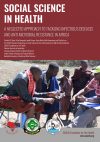Those newly diagnosed with Type 2 diabetes and heart failure are at the greatest 5-year risk of death, according to The American Heart Association
The five-year risk ratio of death associated with heart failure development after Type 2 diabetes diagnosis was three times higher in patients with diabetes than in patients without heart or kidney disease.
COVID-19 stance on diabetes risk
Research, published in Diabetologia, shows that 65% of COVID-19 patients with diabetes admitted to hospital are men with an average age of 70 years. Worse blood sugar control did not seem to impact a patient’s outcome, however, the presence of diabetic complications, increasing age and increased BMI were found to be associated with a higher risk of needing mechanical ventilation and risk of death.
Microvascular complications (eyes, kidneys and nerves) were found in 47% of the subjects, while 41% presented macrovascular complications (arteries of the heart, brain, legs). The presence of microvascular or macrovascular complications more than doubled the risk of death at day 7.
What about Type 2 diabetes and heart failure?
People with Type 2 diabetes are 2 to 4 times more likely to develop heart failure – a condition in which the heart fails to efficiently pump oxygenated blood through the body – than people without diabetes. Research on cardiovascular disease in people with Type 2 diabetes has traditionally involved patients with a long duration of diabetes who are considered high-risk patients. This retrospective, longitudinal study aimed to learn more about the risk of heart failure in people with newly diagnosed Type 2 diabetes.
Heart failure posed the greatest 5-year risk of death for people newly diagnosed with Type 2 diabetes than any other heart or kidney diseases, according to new research published in Circulation: Cardiovascular Quality and Outcomes, an American Heart Association journal.
Bochra Zareini, MD, PhD, principal investigator and research fellow at Herlev Gentofte University Hospital in Copenhagen, Denmark, said:
“With the emergence of novel treatments such as SGLT2 inhibitors and GLP-1 receptor antagonist medications for Type 2 diabetes, some of which are proven to reduce cardiovascular disease risk, clinicians are able to focus on cardiovascular disease and heart failure prevention in patients with Type 2 diabetes.
“Our study highlights which subgroups of patients need and could benefit most from targeted risk evaluation, prevention and treatment.”
The study itself
The study identified patients who were age 18 and older without prior heart and kidney disease and were newly diagnosed with Type 2 diabetes in nationwide, Danish health registers. From 1998 to 2015, more than 153,000 patients were followed for approximately 10 years.
During the median follow-up of 9.7 years, 45.1% of the patients (69,201) were diagnosed with a cardiovascular or kidney disease. Researchers estimated the five-year risk of death, the five-year risk ratios and the decrease in lifespan within five years associated with the development of any cardiovascular disease, such as heart failure, ischemic heart disease, stroke, peripheral artery disease and chronic kidney disease.
Results of the study:
- heart failure in combination with any other diagnosis in the study was associated with the greatest risk of death and highest decrease in lifespan compared to combinations of other cardiovascular diseases and Type 2 diabetes;
- the five-year risk ratio of death associated with heart failure development after Type 2 diabetes diagnosis was three times higher in patients with diabetes than in patients without heart or kidney disease;
- risks were elevated regardless of when the patient developed cardiovascular disease after being diagnosed with Type 2 diabetes; and
the elevated risk of death was present in all subgroups based on the patient’s age, gender and presence of other conditions.
The researchers also compared their findings to other similar, international studies focused on Type 2 diabetes and cardiovascular disease. They concluded their study has some limitations due to a lack of information surrounding clinical factors that would detail the severity of heart failure and Type 2 diabetes, and the progression and severity of Type 2 diabetes.
The researchers also noted that they did not include the treatment effects of various new diabetes medications in the present study, thus, their findings should be interpreted with caution.
The team behind this research
Co-authors are Paul Blanche, Ph.D.; Maria D’Souza, Ph.D.; Mariam Elmegaard Malik, M.D.; Caroline Holm Nørgaard, M.D.; Christian Selmer, M.D., Ph.D.; Gunnar Gislason, M.D., Ph.D.; Søren Lund Kristensen, M.D., Ph.D.; Lars Køber, M.D., D.M.Sc.; Christian Torp-Pedersen, M.D., D.M.Sc.; Morten Schou, M.D., Ph.D.; and Morten Lamberts, M.D., Ph.D. Author disclosures are in the manuscript.
The study was supported by the Danish Heart Association and an unrestricted hospital grant from Boehringer Ingelheim.




























